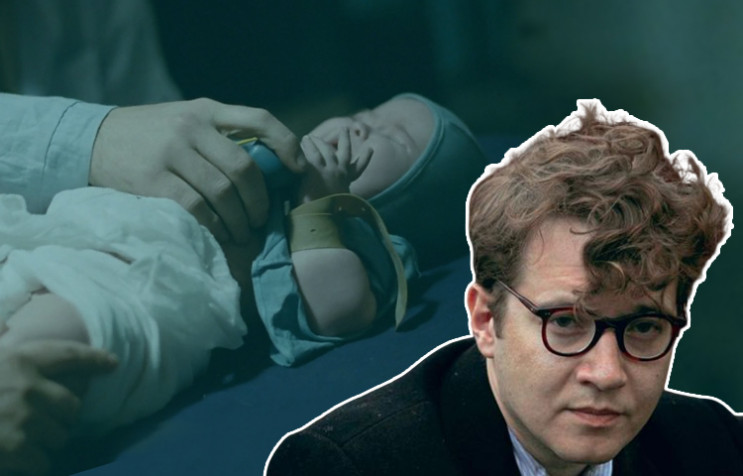Putin attributes victory in WWII “first and foremost to the Soviet people,” organizing the 9 May parade as Russia’s “biggest holiday.” In contrast, there is no consensus among the majority of Ukrainians about celebrating 9 May as the day of Soviet victory. Especially among the young generation, which has become increasingly indifferent towards this holiday.
The war for Ukrainian independence was lost in 1920, and only on 22 August 1992 did the government of the Ukrainian Republic in exile officially transfer power to the government of newly-established independent Ukraine. At the same time, Soviet victory in WWII became yet another occupation for Ukraine while the role of all Ukrainians in WWII is tragic and divided.
More than 200,000 Ukrainians fought in UPA – the Ukrainian insurgent army. From 1942 to 1953, they maintained guerrilla warfare against both Soviet and Nazi armies. Another 200,000 participated in the Nazi police and fought in the Nazi army, including 14,000 volunteers of the 14th Waffen Grenadier Division Galicia. Also, 80,000 Ukrainians fought in the American army, 45,000 in the UK army and 6,000 in the French army against the Nazis. The largest number of Ukrainians, about 6,000,000, fought in the Soviet army.
One important note is that only the UPA and Galicia Division were volunteer units – the Soviet army was mostly compulsorily mobilized. In the Soviet army, the infamous anti-retreat forces, or barrier troops, had to follow Stalin’s order №227 “to be placed in the immediate rear of unstable divisions and, in case of panic and chaotic retreat of division units, to shoot panickers immediately and thus help honest soldiers of divisions to fulfill their duty to the Fatherland.”
Occupation of central Europe, tragedy for Ukraine, victory for Stalin
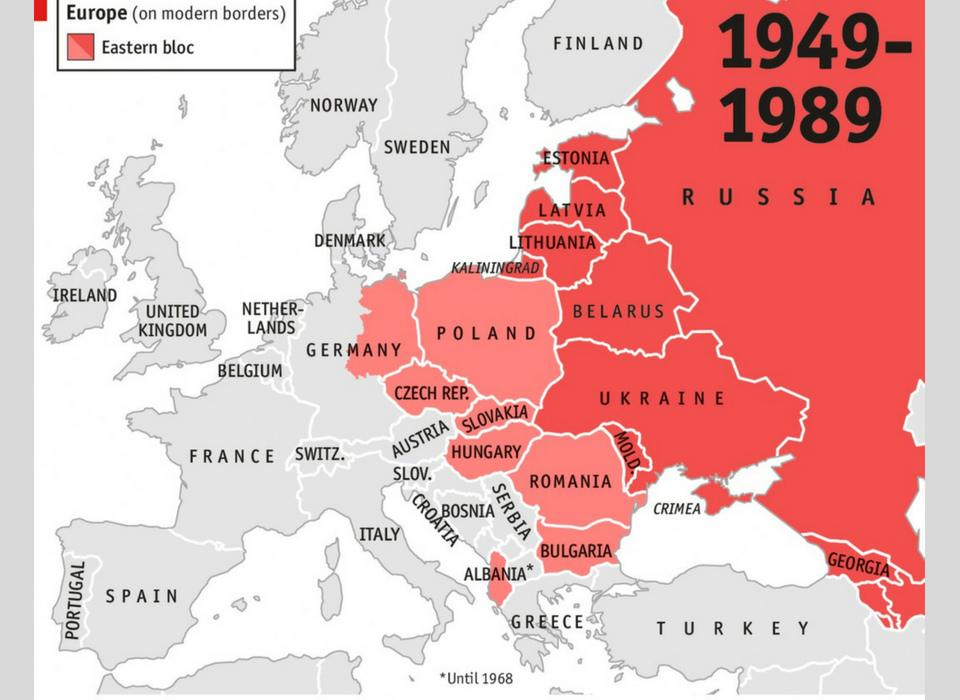
For contemporary Ukraine, the question of who among these soldiers should be glorified is a difficult one, usually influenced by personal family stories. Officially, the Ukrainian state equally condemns the Nazi and Soviet totalitarian regimes for their repressions, according to a law adopted in 2015. Unofficially, veterans of all armies claim in their memoirs that they fought for Ukraine, thus only highlighting the tragic nature of this war.
Those Ukrainians who voluntarily fought in the Soviet army claim that they defended their land (central and eastern Ukraine, which was part of the USSR before WWII) against foreign invasion. Ukrainians who fought in the Galicia Division recall that they fought for Ukraine, believing Hitler’s promise to grant Ukraine true autonomy. Those who fought in UPA recall the most idealistic but the least realistic goal – fully independent Ukraine without any foreign dictatorship, be it German or Russian.
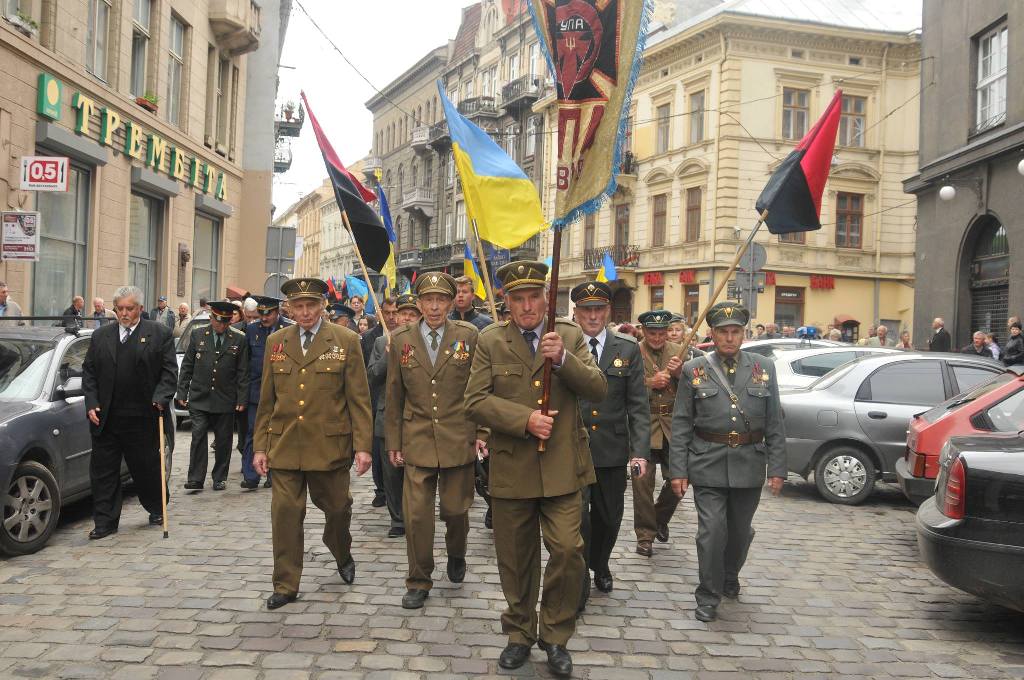
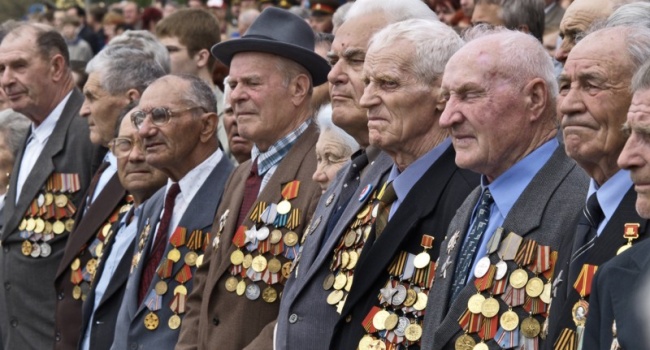

Only in 1945, after the occupation of western Ukraine, Soviet troops, a third of whom were Ukrainian, reported that they killed and detained 100,000 Ukrainian UPA “bandits.”
UPA regiments, supported by locals, continued active resistance in Ukrainian forests until 1953.

The sad truth of WWII is that many Ukrainians killed other Ukrainians who belonged to different armies. Ukrainian historian and former head of the Institute of National Memory Volodymyr Viatrovych summarizes:
In September 1939, when the war officially began... Ukrainians found themselves in the armies of all participants in the war. As of September 1939, about 120,000 Ukrainians were in the Polish army as citizens of the Second Polish Republic, defending their state. Many of them were taken as prisoners, many died.
At the same time, in 1939, millions of Ukrainians were in the ranks of the Red Army, which in the second half of September launched an offensive against Poland from the east. The rest of the Ukrainians fought on the side of Germany, hoping that it would become the force that would help restore Ukraine. Finally, in September 1939, divisions of the organization of Ukrainian nationalists in a number of localities in Galicia and Volhynia raised their uprising.
That is, Ukrainians who did not have their own state not only served in different armies, but sometimes killed each other, fighting for other people's interests. All participants in the war tried to use Ukrainians as a resource.
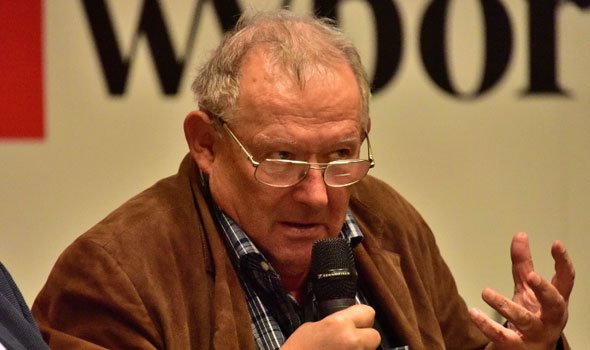
Polish historian and editor-in-chief of Gazeta Wyborcza Adam Mikhnik elaborates further, emphasizing that the end of WWII turned into occupation of Poland and was tragic for both Poland and Ukraine:
The Second World War... began with the joint aggression of Hitler and Stalin against Poland, and ended with a great political triumph of Stalin. But the war was tragic for both Ukraine and Poland...
The Ukrainian tragedy is that in those days Ukrainians fought among themselves: a large part of the Ukrainian population was associated with the Ukrainian insurgent army fighting for an independent Ukraine. But most Ukrainian patriots fought in the Red Army against Hitler. Which often led to Ukrainians shooting at Ukrainians, as was the case in Poland during the First World War and then, after 1944, when Poles from the underground often shot at Poles who were in the Communist army.
Putin’s narrative
The complicated Ukrainian situation is not the case in Putin’s Russia. The obsession with Victory Day (“pobedobesie”) became the core of Putin’s policy. He claims Russia’s special role in the world as the main victor of WWII and blames Ukrainians, Poles, Baltic nations and other central Europeans for alleged collaboration with Nazis and historical revisionism.
The Russian president has even authored an article for The National Interest in June 2020, where he claims that the “Soviet Union saved the entire world.” He blames the weak and selfish policy of western countries regarding Nazi Germany at the beginning of the war and places the Soviet Union as a great liberator:
“It is essential to pass on to future generations the memory of the fact that the Nazis were defeated first and foremost by the Soviet people and that representatives of all republics of the Soviet Union fought side by side together in that heroic battle, both on the frontlines and in the rear.”
The 9th of May, Victory Day, is the biggest holiday for Russians, Putin claims. He praises contemporary soldiers fighting in Syria and the North Caucasus who “proved that they deserve to inherit the feat of the warriors of our homeland who defended it during the Great Patriotic War.”
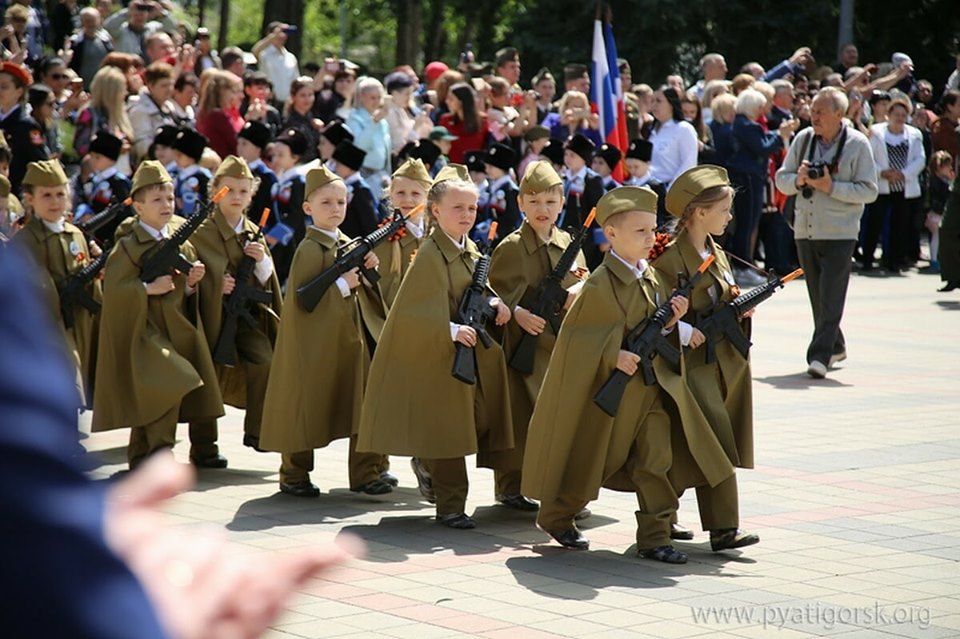
Putin openly claims that the USSR disintegration was “the biggest geopolitical tragedy.” Constantly referring to wartime USSR as “our Motherland,” he indirectly recognizes that the USSR was in fact a Russian communist empire that forcefully occupied other republics.
- Read also: Russia’s triple strategy of proxy war used against Georgia in 1920 and now
- Illusion of a friendly empire: Russia, the West, and Ukraine’s independence a century ago
As Ukrainian historian from Kyiv-Mohyla Academy Vladyslav Hrynevych stresses, Ukrainians were always the “weak link” in the USSR, who unwillingly fought against the Germans, and who created their own army and nurtured hidden opposition to the USSR. He writes:
The predominantly peasant Ukraine, which experienced a colossal humanitarian catastrophe in the 1930s, the Holodomor, which killed at least 3.5 million people, remained a potentially "weak link" in the Stalinist empire... The Nazi occupation of 1941–1944 sharply separated Ukraine from Russia, both politically and mentally, removing it for several years from the influence of Soviet ideology and propaganda.
The level of loyalty of the Ukrainian population to Stalin's power was low: this was evidenced by the mass surrender of Red Army soldiers at the initial stage of the war, and the fact that more than 90% of the local population (5.6 million of them soldiers) remained in German-occupied territory, and an extremely low level of resistance to the new occupier. The national liberation movement in the western regions also became a mass phenomenon.

Speaking on symbolic things, one of the Ukrainian UPA insurgents, Ilya Oberyshyn, came out of the underground, where he had been hiding since the 1950s, only on 3 December 1991, after the results of a referendum confirming Ukraine's declaration of independence from the USSR.
Ukraine and Russia differ dramatically in their attitude to Stalin, but neither Ukraine nor Europe have fully condemned communism
The cult of Stalin and victory in WWII was always important for Russia as a justification of Russia’s dominant role in the postwar world order. Moreover, a sociological survey by Levada center demonstrates that Stalin’s glorification has increased in Russia over the last years.
“When looking at changes in Russians’ attitudes toward Stalin, three different periods can be observed: one defined by negative perceptions (2001-2006), one defined by indifferent attitudes (2008-2012), and one defined by positive assessments (2014-2018)… The stable attitude is praise for Stalin’s contributions to winning the Great Patriotic War. This assessment is stereotypical amongst Russians, and its significance has not changed substantially over the past ten years,” Levada Center outlines the dynamic.
Significantly, only 44% of Russians in 2018, versus 68% in 2008, agree that Stalin was a cruel and inhuman tyrant.
The study also highlights the radical difference between Russian and Ukrainian perception of Stalin:
While 40% of Russians have positive feelings about Stalin (“admiration,” “respect,” and “sympathy”) and 12% have negative feelings (“dislike,” “fear,” “disgust”), Ukrainians display this ratio in reverse—14% versus 42%.

Ukrainian historian Olena Stiazhkina thinks that neither Ukraine nor the rest of Europe is ready to strictly condemn communism, as they did with Nazism. That is why the discussion around WWII is still hot:
"In my opinion, we cannot think that we have put an end to World War II as long as we have a situation where Nazism is recognized as a hostile and unacceptable ideology that encouraged crimes against humanity and communism is not.
Non-condemnation of communism constantly creates traps – in description, analysis, perception and so on. Unfortunately, the normalization of the Soviet Union still remains a dictionary for historiography. Normalization of the Soviet Union remains a part of Ukrainian everyday life. The Sociological Center is conducting a survey: 'What do you think about the St. George ribbon?' [symbol of Soviet victory in WWII]. If communism was condemned, it would sound like 'How do you feel about the Nazi swastika?'"
“Never again” gets its practical meaning if one compares the revanchist Weimar Republic and Putin’s Russia
German political scientists Steffen Kailitz
and Andreas Umland in their 2018 article for the scientific journal Nationalities papers warn that contemporary Russia and the German Weimar Republic have too many similarities and both demonstrate a similar way of descending into totalitarianism:
- The Weimar Republic and the Russian Federation emerged from the radical decline of once-powerful empires: the German Second Reich (1871–1918) and the Soviet Union (1922–1991);
- Many of the two peoples believed that rule by their former adversaries after their collapse would be humiliating;
- Most Germans felt disgraced by the conditions and accusations made by the Entente forces in the Treaty of Versailles;
- Many Russians saw Western influence on post-communist Eastern Europe, the South Caucasus, and Central Asia as victorious and derogatory towards Russia and its supposedly special rights in the former Soviet empire;
- Both nations claimed that part of their own former main ethnic groups lived abroad. About 8.6 million so-called "Volksdeutsche'' lived in Eastern and Southern Europe after 1918, and about 25 million so-called "Russian compatriots" lived in the former Soviet republics after 1991;
- As a result, radical chauvinism in these two countries has become extremely pan-Germanist or Panslavist.
This tendency in contemporary Russia is well reflected in contemporary Russian domestic TV narratives:
NATO prepares to attack, says Kremlin propaganda amid record Russian troop buildup at Ukraine border
The further limitation of freedom of speech in Russia regarding WWII underpins this dangerous trend towards radicalization. Article 354.1 of the Russian criminal code envisages 5 years of imprisonment for “dissemination of knowingly false information about the Soviet Union during World War II, veterans of the Great Patriotic War.”
The amendments signed by Putin on 5 April 2021 also introduce fines and imprisonment for internet publications and posts about WWII that the Russian government would consider false.
The Russian victorious narrative about WWII is alien to Ukraine

Ukraine, along with Poland, suffered the heaviest human losses during the Second World War. Famous Ukrainian historian Yaroslav Hrytsak says that in the period of WWII, Ukraine was “in the heart of darkness.” That makes the Russian victorious narrative alien to Ukraine, which suffered at the hands of both Nazi and Soviet occupiers. That also makes the Ukrainian perception of the second World War different from Western Europe.
If for Western Europe the end of the war meant the victory of democracy, for Ukraine it meant the enforcement of Stalinism. Traces of Soviet occupation still affect Ukraine.
Historian Hrytsak notes in his speech, that the Ukrainian issue was the key for WWII. Ukrainian resources – coal, oil, food, and above all people – were key in winning the war:
“The fate of the war was decided not only on the Western Front, but in the area between Berlin and Moscow – a territory that Timothy Snyder calls 'bloodlands.' At the center of these lands was Ukraine and the 'Ukrainian question'…"
There is nothing good about being a land of resources “in the heart of darkness” between two aggressive competitors. The World War II for Ukrainians serves as a reminder of the horrors that occurred and may occur again if a free independent state is lost to an aggressor.
Why have two revolutions won in Ukraine but none in Russia or Belarus? Historian Hrytsak answers
Read also:
- Understanding the Ukrainians in WWII. Part 1
- Understanding the Ukrainians in WWII. Part 2. Stories of Ukrainians in the Red Army
- Understanding the Ukrainians in WWII Part 3. Of German plans and German collaborators.



